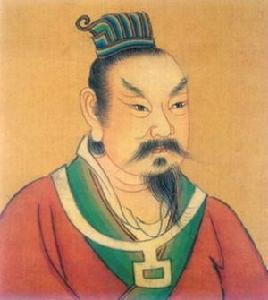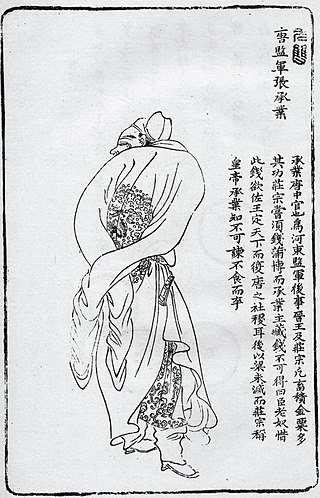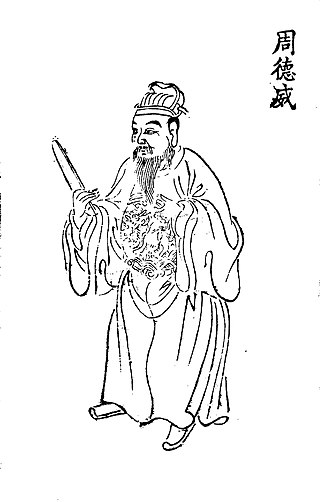
Emperor Taizu of Liang (梁太祖), personal name Zhu Quanzhong (朱全忠), né Zhu Wen (朱溫), name later changed to Zhu Huang (朱晃), nickname Zhu San, was a Chinese military general, monarch, and politician. He was a Jiedushi and warlord who in 907 overthrew the Tang dynasty and established the Later Liang dynasty, ruling as its first emperor, ushering in the era of the Five Dynasties and Ten Kingdoms. The last two Tang emperors, Emperor Zhaozong of Tang and Emperor Ai of Tang, who "ruled" as his puppets from 903 to 907, were both murdered by him.

Li Keyong was a Chinese military general and politician of Shatuo ethnicity, and from January 896 the Prince of Jin, which would become an independent state after the fall of the Tang dynasty in 907. Li served as a Jiedushi provincial military governor during the late Tang period and was an instrumental figure in the development of a Shatuo base of power in what is today's Shanxi Province of China. His son Li Cunxu, a child of his concubine Lady Cao, would succeed him as Prince of Jin and eventually become the founding emperor of the Later Tang dynasty in 923.

Li Siyuan, also known by his temple name as the Emperor Mingzong of Tang (唐明宗), was the second emperor of the Later Tang dynasty of China, reigning from 926 until his death. He was an ethnic Shatuo originally named, in the Shatuo language, Miaojilie (邈佶烈).
Shang Rang (尚讓) was a major follower of Huang Chao, an agrarian rebel leader against the rule of the Chinese Tang dynasty and carried prominent titles after Huang declared himself the emperor of a new state of Qi. As Huang neared defeat in 884, Shang turned against him and submitted to the Tang general Shi Pu and participated in the final destruction of Huang's army. Shang himself was later killed by Shi.
Consort Dowager Liu was the wife of Li Keyong, the founder of the Five Dynasties and Ten Kingdoms period state Jin. However, despite this status, after Li Keyong's son Li Cunxu later defeated Jin's rival Later Liang and established Later Tang as its Emperor Zhuangzong, she was not honored as empress dowager, but only given the lesser title of consort dowager.
Wang Rong, was a warlord in the final years of the Tang dynasty who later became the only ruler of the state of Zhao during the Five Dynasties and Ten Kingdoms period. Late in Tang, he initially tried to chart an independent course between the more powerful warlords Zhu Quanzhong and Li Keyong, but later was forced to become Zhu's vassal, although he continued to govern his domain without much interference from Zhu. After Zhu declared himself the emperor of a new dynasty of Later Liang, Wang continued to serve as a vassal and was created the Prince of Zhao. Later, though, when the Later Liang emperor tried to seize the Zhao domain by force, Wang broke away from Later Liang and realigned with Li Keyong's son and successor Li Cunxu the Prince of Jin instead. In 921, Wang was overthrown and killed in a coup led by his adoptive son Wang Deming, who subsequently took over his domain and changed back to the birth name of Zhang Wenli, before dying later in the year; Li Cunxu then defeated and killed Zhang's son and successor Zhang Chujin, incorporating Zhao into his Jin state.
Li Hanzhi, formally the Prince of Longxi (隴西王), nickname Li Moyun (李摩雲), was a Chinese Buddhist monk, military general, politician, and warlord of the late medieval Tang dynasty. He was initially a follower of the major agrarian rebel Huang Chao, and later became a Tang general, mostly known for his service under Li Keyong. He was known for ferocity in carrying out raids.
Ge Congzhou, courtesy name Tongmei (通美), formally the Prince of Chenliu (陳留王), was a general serving under Zhu Wen while Zhu Quanzhong was a warlord and military officer late in the Tang dynasty. Ge's health problems later forced him into retirement, but he remained in honored status after Emperor Taizu established Later Liang.

Li Cunxiao (李存孝), né An Jingsi (安敬思), was an adoptive son of the late-Tang dynasty warlord Li Keyong who contributed much to Li Keyong's campaigns, but who later rebelled against his adoptive father. He subsequently was defeated by Li Keyong and executed by dismemberment after he surrendered, although Li Keyong soon regretted his death.
Zhu Jin (朱瑾) (867–918) was a warlord late in the Chinese Tang dynasty who would later be a major general of the Wu state during the subsequent Five Dynasties and Ten Kingdoms period. In the late Tang years, Zhu Jin, as the military governor (jiedushi) of Taining Circuit would form a power bloc with his cousin Zhu Xuan the military governor of Tianping Circuit, but they were both eventually defeated by Zhu Quanzhong the military governor of Xuanwu Circuit. Zhu Xuan was killed, and Zhu Jin fled to the domain of Yang Xingmi the military governor of Huainan Circuit ; he would thereafter serve under Yang and Yang's successors, whose domain formed the Wu state eventually. In 918, angry at the arrogance of the Wu junior regent Xu Zhixun, he assassinated Xu Zhixun, but Xu Wen's troops attacked him; he committed suicide when he saw that there was no escape.
Ding Hui (丁會), courtesy name Daoyin (道隱), was a general who, for most of his career, served under Zhu Quanzhong while Zhu was a major warlord late in the Chinese Tang dynasty. In 906, as Zhu was planning on seizing the Tang throne and establishing his own dynasty, Ding defected to Zhu's rival Li Keyong the military governor of Hedong Circuit and thereafter served in Li Keyong's state of Jin until his death.
Li Cunshen (李存審), né Fu Cun (符存), often referred to in historical sources as Fu Cunshen (符存審), courtesy name Dexiang (德詳), was a Chinese military general, politician, and singer of the Chinese Five Dynasties and Ten Kingdoms period dynasty Later Tang and Later Tang's predecessor state Jin. He was an adoptive son of Jin's first prince Li Keyong and later served in a number of major campaigns under the reign of Li Keyong's son Li Cunxu, helping Li Cunxu to establish Later Tang as its Emperor Zhuangzong.

Zhang Chengye, né Kang (康), courtesy name Jiyuan (繼元), posthumous name Zhengxian (正憲), was a Chinese government official and eunuch. He originally served the Tang dynasty, but later became an important advisor to Former Jin princes Li Keyong and his successor Li Cunxu, who would later establish the Later Tang dynasty.

Zhou Dewei (周德威), courtesy name Zhenyuan (鎮遠), nickname Yangwu (陽五), was a Chinese military general and politician of the Chinese Five Dynasties and Ten Kingdoms period state Jin.
Liu Xun was a major general of the Chinese Five Dynasties and Ten Kingdoms period state Later Liang. He was a key commander of Later Liang forces in its struggle with its archenemy Jin, but, after repeated defeats by the Jin prince Li Cunxu, Liu sought retirement, and was subsequently poisoned to death by the Later Liang emperor Zhu Zhen, who doubted his loyalty.
Zhang Juhan (張居翰) (858-928), courtesy name Deqing (德卿), was a senior eunuch of the Chinese Five Dynasties and Ten Kingdoms period Later Tang state, serving as a chief of staff for Later Tang's founding emperor Li Cunxu.
Ren Huan was a Chinese military general and politician of the Chinese Five Dynasties and Ten Kingdoms period state Later Tang. He served as a chancellor during the reign of Later Tang's second emperor Li Siyuan, but became embroiled in a power struggle with Li Siyuan's powerful chief of staff An Chonghui. He eventually was forced into retirement, but An eventually had Li Siyuan order him to commit suicide.
Li Cunxin (李存信) (862–902), originally Zhang Wuluo (張污落), was a military general in imperial China's Tang dynasty, serving the Shatuo military leader Li Keyong, who adopted him as a son.
Shi Jingcun (史敬存), known as Shi Jingsi (史敬思) in Chinese historiography likely for naming taboo reasons, was a minor general in imperial China under the Shatuo military leader Li Keyong near the end of the Tang dynasty. He sacrificed his life to help his inebriated lord escape an assassination attempt by Zhu Wen in Zhu's territory.
Li Cunzhang (李存璋) was a military general in imperial China's Tang dynasty, and later the Jin territory in the ensuing Five Dynasties and Ten Kingdoms period after Tang's collapse. He served the Shatuo leaders Li Keyong — who adopted him as a son — and Li Keyong's biological son and successor Li Cunxu.





